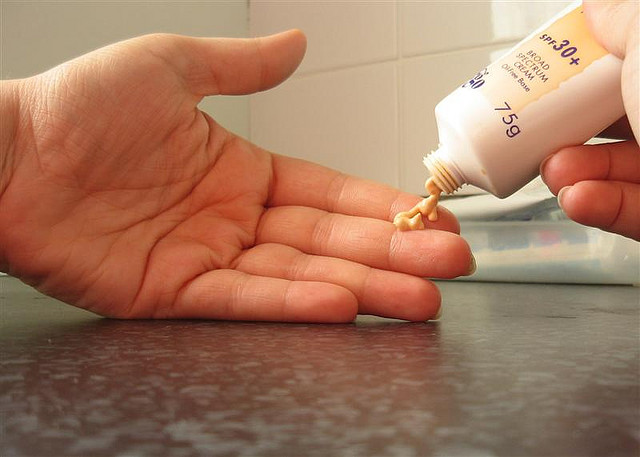
I’ve posted about the importance of protecting your skin from the sun before, about the danger of melanoma, and about choosing safe sunscreens. But if you have eczema or psoriasis, you may be a little confused. After all, some sun exposure is recommended for some of these conditions. How do you know what’s helpful, and what puts you at risk?
Typically, I recommend sun protection for everyone, but there are a few exceptions. Read on to find out!
Skin Affected by Chemotherapy or Radiation: Both of these cancer treatments make the skin more sensitive to the sun. Doctors call it “photosensitivity.” It’s imperative that you become hyper vigilant about sun protection while you’re going through these treatments, because a sunburn could increase your risk of skin cancer, or create permanent scars. Use sunscreen, but better yet, get used to donning hats and long sleeves.
Skin After Surgery: I have a scar on my neck from an early cancer surgery that to this day remains sensitive to the sun. If you’ve had surgery on any area of exposed skin-even something relatively minor like a small scar on your cheek where you had a mole removed-be particularly careful about protecting that area with sunscreen and clothing. This is especially important while the scar is still healing, as sun damage can slow that healing, but it remains important for years afterwards.
Skin on Certain Medications: If you’re taking some antibiotics, antihistamines, diuretics, diabetic drugs, painkillers, acne medications, antidepressants, birth control, and other medications, your skin is likely to become photosensitive, which increases your risk of burning and inflammation. The drug in your system may actually react with the UV rays to damage the skin or create an allergic reaction. Take extra care!
Eczema: Researchers aren’t yet sure why, but it does seem that some sun exposure is helpful for this skin condition. Light therapy has been used for decades as part of typical eczema treatment. One theory is that the vitamin D you get from the sun (or from light) may help in producing more skin proteins that protect against skin infections. Some types of eczema can actually become worse with sun exposure, however. Check with your dermatologist. If you’re advised to try sun exposure, make sure it’s of a moderate nature. Finally, avoid tanning salons, as the intense UV rays are more damaging then helpful.
Psoriasis: Like eczema, psoriasis may improve with some sun exposure, but a sunburn can cause the condition to flare up. Particularly if you’re a fair-skinned person, you may not be able to manage any sun exposure without getting burned, in which case it’s better to always protect yourself. UVA treatment is often recommended for the treatment of psoriasis, however, so a little summer sun may be just what the doctor ordered. Just don’t overdo it! Also, if you have any open wounds, be sure to protect those from the sun until they heal.
Rosacea: Rosacea is definitely made worse by any sun exposure. In fact, surveys show that the sun is the most common trigger of rosacea symptoms. Keep your sunscreen with you; wear hats, sunglasses, and long sleeved shirts and pants; use an umbrella when you go to outdoor events; avoid intense sun; drink plenty of fluids; and try to stay cool.
How do you handle your skin condition in the summer months? Please share your story.
Photo courtesy HP Art via Flickr.com.

